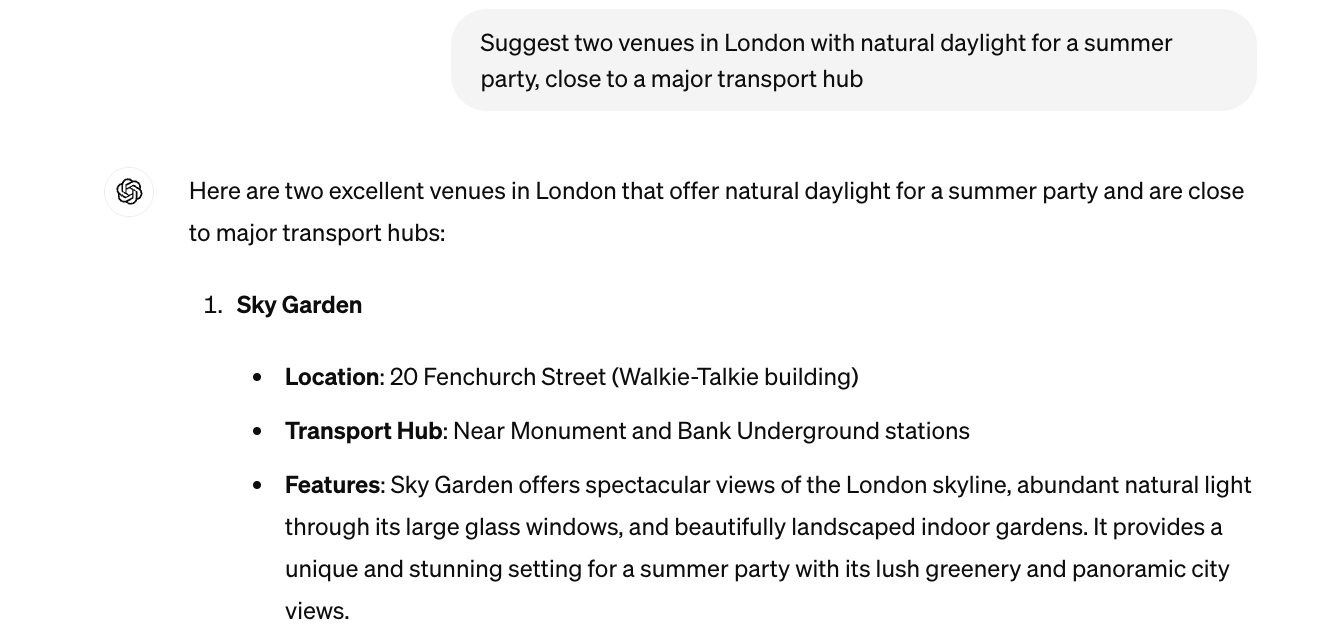Like so many aspects of event planning, the way in which people find and book venues for their events is evolving fast.
In the second part of Hire Space and MeetEngland’s series on how AI is impacting the events sector, we look at the very start of the event lifecycle and spotlight the innovations happening to speed up the sourcing process, especially for business event planners.
We ask what venues and destinations can do to stay ahead of the curve and consider the implications for the event sector as a whole.
The Background
To understand how venue booking is now ripe for innovation through AI, it’s helpful to look at how the industry has evolved in the last two decades. Without the developments made in buyer and supplier behaviours, the technology that has emerged alongside new groundbreaking AI technologies wouldn’t be accessible in the way they are today.
AI relies on data, and the last 20 years have seen a rapid accumulation of publicly accessible data. So let’s consider this in four stages.
Stage 1 - Pre RFP
Before RFP (Request for Proposal) tools emerged, event planners relied primarily on offline channels such as agencies, print publications (The Blue & Green magazine being a good example) and word of mouth. Digital communication with venues was limited. This worked well for the times, but it meant very little data for smart AI to learn from.
Stage 2 - RFP (Early 2000s→)
The first RFP tools emerged in the early 2000s and immediately simplified the process of gathering proposals from multiple venues, allowing event planners to quickly compare options. Web-based platforms and enterprise software solutions enabled these tools to be widely accessible, enhancing communication between event planners and venue providers. Crucially, it dramatically increased the amount of digital data on supplier inventory and buyer preferences.
Meanwhile, venues across the world built their own websites and started communicating by email, also vastly increasing the global data pool.
Stage 3 - Marketplaces (2010s→)
Before long, consumer-facing digital marketplaces with extensive venue inventory emerged, displaying detailed, transparent information on venues. Where RFP tools had largely been restricted to paying customers, the new marketplaces were open to everyone. The acceleration of data accumulation ramped up again.
To give an example, hirespace.com alone has serviced over 12 million people, and generated over 250,000 enquiries for venues, worth over £12bn. And that’s just one marketplace. All this data on what types of venues buyers wanted, with which features, in which locations - and what venues were able to offer in return - was now sitting there waiting to be turned into actionable insight.
Importantly, marketplaces also started displaying public venue pricing for the first time. This opened the door for dynamic pricing models and value benchmarking at scale - two huge developments we’ll come onto later.
Throughout this period city convention bureaus have remained an important connector for planners in their destination. This has come in various forms: an in-depth knowledge of relevant venues in accordance with the client brief, introductions to important stakeholders beyond hospitality such as sector and academic leaders, as well as strong local insight in elevating the success of the event.
Stage 4 - Smart tech and deeper data consolidation (2020s→)
The COVID-19 pandemic changed many things in events, as buyers and suppliers were forced to adopt new technology solutions. Meanwhile, smart AI tools, enabled by rapid advances in LLMs (Large Language Models), began consuming the vast data sets that had accumulated, enabling them to fundamentally understand buying habits and the purchasing journey.
In turn, to fuel these further, data consolidation began to take hold as buyer and supplier networks began to integrate, offering mutual integrations to streamline the buying process.
The net result meant more digital activity, more collaboration, more data for AI to learn from, and ever-smarter tools to enhance the experience for buyers.
At the same time, consumer expectations were changing, with buyers across all sectors expecting instant results and speed of use.

What’s Possible Now, That Wasn’t Before?
All this data, and all this technological development, means it’s possible to build tools and services that help to remove the bottlenecks and repetitive administrative tasks that planners currently face.
AI cannot replace event planners, with their creativity, strategic insight and ability to make meaningful human connections. But it can make them more efficient, and in doing so, make their jobs less labour intensive and less stressful.
Here are three examples of tools that are available now, or coming very soon, that will help event professionals do more with less.
AI Agents
Take a moment to consider that friend you’ve got who you go to for recommendations. The restaurant expert, for example - this person always knows the most exciting openings, and they’re always up to date.
Now, imagine that friend knows about every single restaurant in the world. And, they know when those restaurants open, and when they’re likely to have availability. They know how much natural daylight they have, and how many people you can seat in each room. They can tell you their customer rating, and whether the feedback of other diners is improving over time. They can show you photos of the restaurant, and give you a floorplan. All within seconds.
And, because they’re your friend, they already know what types of restaurants you like. So they won’t suggest a steakhouse if you’re a vegetarian, or an all-you-can-eat buffet if you’re dieting.
Now, substitute restaurants for venues and event suppliers, and that’s what AI Agents can do for event planners. The most sophisticated AI agents can already do most of the things mentioned above, and the technology is developing fast. Soon no event planner will have to search online for inspiration, trawl venue websites for information, or spend hours phoning and emailing with no reply.
Here’s an example of a response from an AI interface:

So, information on suppliers will be instant and available at planners’ fingertips, allowing them more time to focus on making better events, while city convention bureaus remain a valuable resource for in-depth destination insight and expertise.
Smart Content Generation
As well as collating information, AI can present it in a way that will help planners communicate with other event stakeholders - such as their events committee, their clients, or their budget holders.
No event can get off the ground unless a planner can build a case for it, and succinctly communicate the costs and benefits of holding that event.
With AI, doing this can be significantly quicker and easier.
Let’s take venue shortlists as an example. As any busy event planner will tell you, creating a venue shortlist to share with event stakeholders can be painstaking. For instance, one venue will send their quote via PDF, while another venue, via email. Or, one will quote venue hire, the other a Day-Delegate-Rate.
Collating and standardising this information can take hours.
Now, AI can collate and standardise this information as it arrives, and instantly turn it into a single, sharable proposal. Here’s an example of a venue shortlist, created in minutes. With tools like this available, the days of tiresome copying and pasting to create an event proposal are over.
Here are some other examples of smart AI tools that can help you create and communicate quickly, and so make it easier to get your event project off the ground:
- Beautiful AI, Pop AI or Slidesgo for creating presentations and pitch decks
- QuillBot, Jasper.AI or Writesonic for writing and summarising
- WriterBuddy or Wix for great email/proposal headlines
- StarryAI, Piscart and Photoleap for creating proposal imagery and logos
- Animaker and Wave.Video for simple video creation
All these tools mean more time for event planners and more focus on strategy and delivery.

Price Benchmarking
Through predictive pricing, AI can implement dynamic pricing models that adjust venue prices based on demand and seasonality. This works for both sides of the market, in that it helps venues maximise return on inventory while offering instant and competitive rates to planners.
Advanced venue booking platforms now offer instant quotes for all events, allowing event teams to quickly set an initial budget for their event. This is especially helpful at the conception stage of an event: when you’ve got an idea for an event, but want to know roughly what it will cost before you put hours of work into getting quotes and putting a proposal together.
Through predictive pricing, a planner can roughly cost their event in seconds, and then decide whether it’s worth putting the work in.
And, with AI-powered price benchmarking, a planner can see how a quote from one venue compares to a likely quote from another venue. So, planners can test the market quickly, and feel confident they’re getting the right price.
Settling on a price has always been a convoluted process in events, slowing the planning process and putting the event itself in jeopardy. With AI, this process will be significantly simplified - ultimately meaning more events.
There are many other examples of how AI speeds up the event booking process, for instance:
- Automating customer response, speeding up integration with suppliers
- Contract management, simplifying the process of interpreting and standardising supplier contracts
- Optimising for variables like the weather, or currency fluctuations
- Driving data insights, to help planners pick the right venues
- Supporting sales and marketing activity, to reach more potential attendees
All things that currently take up valuable time for planners and decision-makers.
The most sophisticated venue booking platforms now allow planners to do all of these things within one interface.

How Venues, Suppliers and Destinations Can Win More Business
With so many new tools and resources out there helping event planners book events, forward-thinking venues and suppliers are already working hard to take advantage.
Here are a couple of ways they’re doing this:
- Making sure all online information is up to date and relevant. Every website, publicly accessible PDFs, venue marketplace and listing site, and anywhere else there’s information on the venue or destination, should have the latest pricing, features and photos. This information will be found and amplified by AI tools.
- Using the Smart Content Generation tools mentioned above. Venues currently spend approximately 60 hours every week creating proposals for clients. This can be halved, or more, using the tools mentioned above. Sophie Linin, Deputy Head of Events at Royal Museums Greenwich, says "I use Open AI to support internal and external communications, such as drafting marketing materials and creating training templates for our sales team."
- Applying AI customer service tools (Hume.Ai, to give one example), especially to service lower value enquiries.
Make no mistake, the adoption of AI in events is a great thing for venues. It means more events and more business. Those that keep their digital footprint strong, and use third-party AI tools to drive internal efficiency, will reap the benefits.
The Big Win - Event ROI
AI isn’t perfect (yet) and the events sector is only at the beginning of its journey using the technologies it enables.
One easy conclusion, though, is that it will have a big impact on the most valuable metric of all - return on investment.
Where previously it would take weeks and months to book an event supplier - from discovery to outreach, to negotiation, to contracting and payments - this can now often be achieved in hours and days.
This is a fundamental shift and will make it easier than ever before to justify holding an event. Where previously, budget holders may have been deterred by the operational expenses of event planning, they can now be better inspired by the many upsides of bringing people together - brand reach, lead generation, customer loyalty, culture, education and thought leadership.
This means more events, a stronger event sector, and happier, more successful event planners.
“Event professionals embrace the value of personal interaction, an essential part of winning and delivering memorable events,” said Paul Black, Head of Business Events at MeetEngland (part of VisitEngland). “It’s great to see how new AI tools can support event planners to complete the most repetitive and time-consuming tasks, accelerating the booking process and leaving more time to focus on client engagement and relationship building. Alongside the integration of AI into venue sourcing to support data gathering and analysis, the role of city convention bureaus will continue to be a highly valuable personalised resource to help planners define their strategic decision-making when considering the destination for their next business event, providing that holistic, impartial and personalised expertise.”
Perhaps the final word should go to Sam Altman, founder of Open AI and a leader in global AI adoption. When asked recently “Is there a job title that you envision being mainstream because of AI?’, he replied, “‘I think there is going to be a premium on human, in-person fantastic experiences.”
He’s right. Human interaction will remain the most powerful form of engagement, and it will be easier than ever before to facilitate. Technology will never replace the fundamental power of events, but it will enable more of them.
That makes it a very exciting time for event planners.





